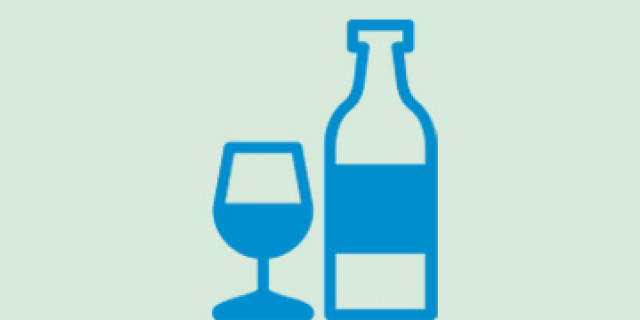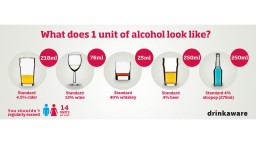Alcohol misuse

Alcohol misuse
by Lynn Millinson, Substance misuse nurse
With the outbreak of COVID-19, we're facing extraordinary government measures intended to keep us, our families and our communities safe. We must follow these to support our NHS, however these measures can impact our mental health and wellbeing. To help the veteran community during this time, the Combat Stress clinical team have created a series of resources to help.
Here, we'll discuss how to manage substance and alcohol abuse during this difficult time.
Managing Our Alcohol Intake During COVID-19
Government guidance for the safe intake of alcohol for men and women is to remain under 14 units weekly and have a minimum of three non-alcohol days spaced out during each week.
Research has proven excess alcohol intake has an impact on your physical and mental health.
It’s important to understand the impact alcohol can have, especially during this time when we are all having to isolate and it’s easy to fall into unhealthy habits.
Hopefully this webpage will help you to be able to:
- Understand the impact alcohol has on your mental and physical health
- Recognise the impact alcohol can have on your physical and mental health
- Recognise triggers that may increase your alcohol intake
- Accurately calculate the units in specific measures of alcohol
- Alternative coping skills to drink less.
Impact on mental and physical health
Drinking alcohol regularly lowers the levels of serotonin in the brain - this is the chemical that helps regulate our mood. Regular use of alcohol for those with depression results in a snowball effect and can lead to: lack of motivation; anger; poor sleep; anxiety; self-neglect; irritability or agitation without reason; thinking about suicide whilst drinking alcohol; and anger outbursts.
Alcohol is broken down by the liver, one of the largest and most complex organs in the body. Your liver stores vital energy and nutrients, creating proteins and enzymes needed to maintain good health and breaks down harmful toxins such as alcohol. Some examples of how excess or long-term use of alcohol can affect your physical health are: heart problems; diabetes; liver disease; cognitive impairment; weight gain; lack of energy and motivation; increased depression; and anxiety.
Triggers that may increase your alcohol intake during COVID-19
Isolation – you live alone, unable to go to work, unable to do your normal daily activities.
Boredom – no access to outside amenities, lack of routine.
Stress – losing your job, money issues, family issues.
Try keeping a mood diary so you can reflect upon and learn your own triggers
Suggested Download: The Combat Stress Mood diary - May 2020
Tips to help reduce your alcohol intake during COVID-19
- Plan your day. Structure is important to relieve boredom and doing things you enjoy will help to relax you.
- Go online and connect with your local community. This can be achieved through different areas such as registering for the app Nextdoor – this will help you connect with your local community, or by volunteering through https://www.goodsamapp.org/NHS to collect and deliver essentials to the old and vulnerable.
- Start up an exercise program in your home or in your garden.
- Learn a new skill.
- Have a clear out.
- Connect with relatives and old friends.
Know your limit – alcohol units
Learning how to count your units of alcohol daily/weekly is a good way to monitor your intake. Fill in this self-assessment questionnaire to help you identify if your relationship with alcohol is about right, or if the amount you drink is risky to your health.
Additional resources:
- Self Assessment Questionnaire - May 2020
What is an alcohol unit and how to calculate your alcohol intake.
One unit is 10ml or 8g of pure alcohol. Because alcoholic drinks come in different strengths and sizes, units are a way to tell how strong your drink is.
On average an adult will process one unit of alcohol in around one hour so that there's none left in their bloodstream, although this does vary from person to person.
How to count your units:
Strength (ABV) x volume (ml) divided by 1000 = units
Example: 12% x 125ml (wine) divided by 1000 = 1.5 units

Alternative coping skills to drink less
It's easy to drink more alcohol than you realise when pouring your own drink at home, look at these tips to help you reduce your intake.
- Pour small amounts into your glass and try to opt for a smaller glass.
- Have a non-alcoholic drink in between each alcoholic drink?
- Measure your spirits instead of free pouring them - unit measure cups can be bought online or use a measuring jug that has ml measurement on it. (10ml 1 unit).
- Drinks diary/tracker (see additional resources below).
- Band technique. This is a good method to help with reduction of alcohol, by wearing a band on your wrist you can ping this up to 4 times each time you get an urge for alcohol.
- Breathing 4,4,4. To use this technique, breathe in for 4, hold for 4 and release for 4.
Additional Resources
- Combat Stress Drink Diary - May 2020
URGENT HELP NEEDED?
Our 24/7 free Helpline remains open, so please do not hesitate to call if you feel you need advice or support with your alcohol intake, aternatively contact your GP.
Combat Stress 24/7 Free Helpline 0800 138 1619.
If you feel unwell and require medical support please contact your GP, 111 or in emergency dial 999.
